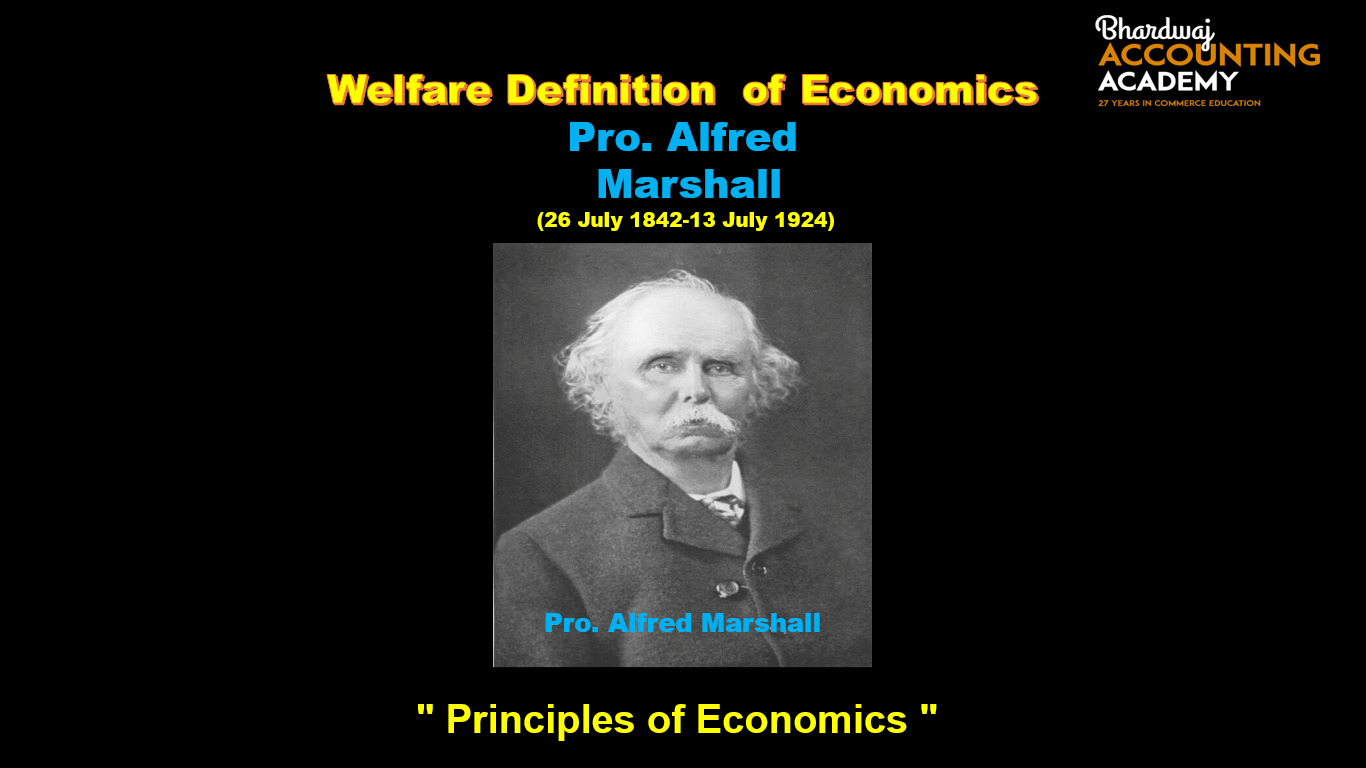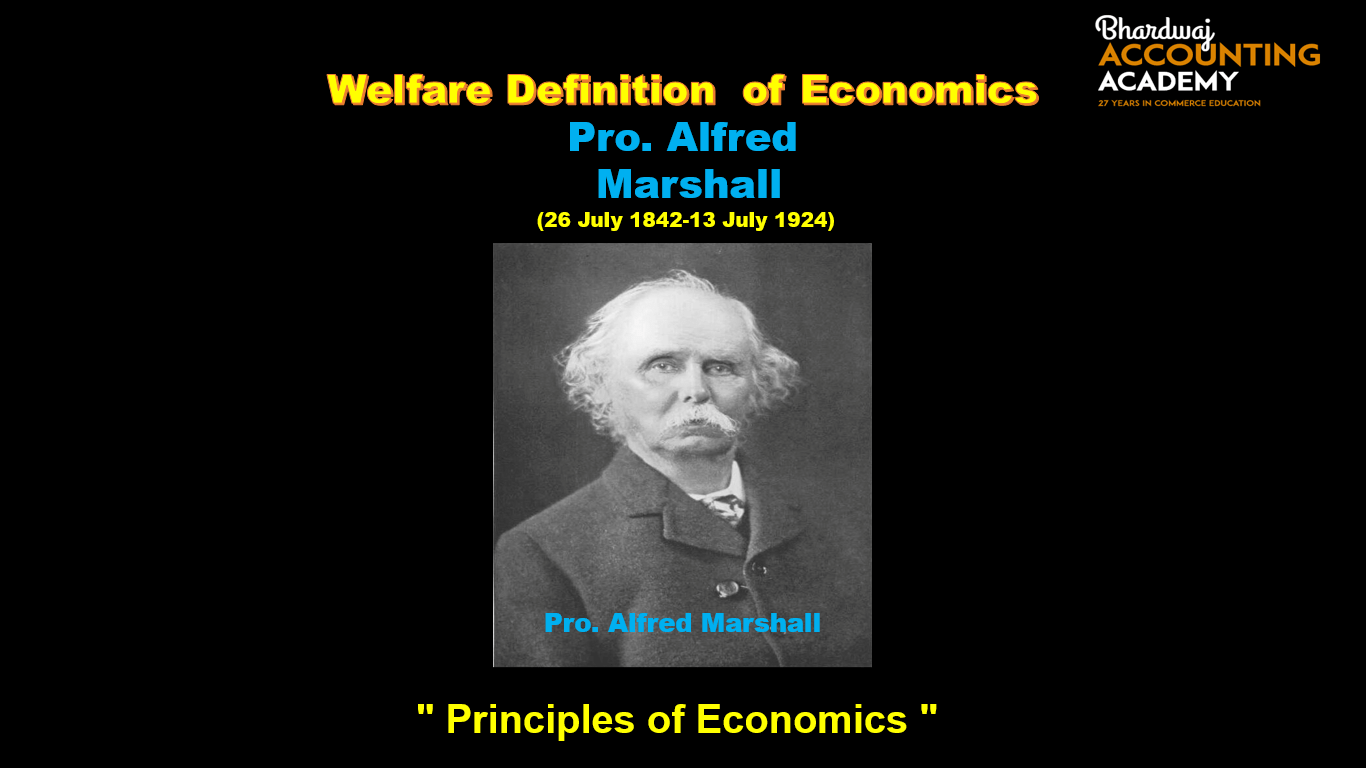Table of Contents
Welfare Definition Of Economics by Alfred Marshall
Professor Alfred Marshall’s “Principles of Economics” was indeed published in 1890, and his definition of economics, emphasizing human welfare, is famously known as the Welfare Definition of Economics.
” Economics is a study of mankind in the ordinary business of life; it inquires how he gets his income and how he uses it. It examines that part of individual and social action which is most closely connected with the attainment (acquisition) and with the use of the material requisites of wellbeing. Thus it is on the one side a study of wealth; and on the other, and more important side, a part of the study of man”.
Key Points of Pro. Marshall Definition:
- Alfred Marshall put forward this definition.
- According to Alfred Marshall, economics is the study of man in the ordinary business of life.(Study about the economic activities of man)
- Ordinary business of life” refers to the daily, routine activities that people engage in to earn a living, acquire goods and services, and manage their resources.
- It examines how a person gets his income and how he invests it.
- “Attainment” primarily means achieving or acquiring something, usually through effort.
- Thus, on one side, it is a study of wealth.
- On the other hand, the more important side, a part of the study of man”.
- “Material requisites” are the basic things we use or buy with money to meet our daily needs and improve our standard of living.
- Well-being refers to the overall quality of life and happiness of people, especially in terms of their basic needs being met.
Main features of Welfare Definition –
The main features of the Welfare definition are as follows:
Main Characteristics of Marshall’s Welfare Definition:
-
Economics is a Social Science:
-
Economics studies the behavior of human beings living in society, not in isolation.
-
It focuses on the actions of individuals and groups in economic life.
-
-
Study of Material Welfare:
-
Economics is concerned with the part of human life related to material well-being—food, clothing, shelter, and other goods/services.
-
Non-material aspects like love, honor, or spiritual well-being are not included.
-
-
Means to Human Welfare:
-
Wealth is not the end, but a means to achieve human welfare.
-
The goal of economics is to improve living standards and quality of life.
-
-
Focus on the “Ordinary Business of Life”:
-
Economics deals with regular economic activities such as earning income, producing goods, spending money, saving, etc.
-
It excludes abnormal or extraordinary events (like natural disasters or extreme behavior).
-
-
Emphasis on Real Human Beings:
-
Economics studies people as they are, not in idealized or hypothetical forms.
-
It examines actual human behavior in everyday life.
-
-
Normative in Nature:
-
Marshall’s definition includes value judgments about what is good or bad for human welfare.
-
It emphasizes what ought to be, not just what is.
-
-
Dual Aspect – Wealth and Man:
-
Economics studies both:
-
Wealth: How it is produced and used.
-
Man: How wealth affects human life and welfare.
-
-
But man is central, and wealth is secondary.
-
Criticisms of Welfare definition-
For a long time, the definition of economics given by Alfred Marshall was generally accepted. However, Marshall’s definition was criticized by Pro. Robbins. In his book “Nature and Significance of Economics Science” (1932) Robbins gave a critical review of the welfare definitions of economics. These criticisms are discussed below.
1. Marshall ignores the non-material services like the services of teacher, services of doctor, which has an important contribution of economic welfare.
2.Robbins argued that Marshall could not establish a link between the economic activities of human beings and human welfare. There are various economic activities that are detrimental to human welfare. The production of war materials, wine, etc., are economic activities but do not promote welfare of any society. These economic activities are included in the subject matter of economics.
3. Marshall’s definition aimed at measuring human welfare in terms of money. But ‘welfare’ is not amenable to measurement, since ‘welfare’ is an abstract, subjective concept. Truly speaking, money can never be a measure of welfare.
4. Marshall’s ‘welfare definition’ gives economics a normative character. A normative science must pass on value judgments. It must be decided whether a particular economic activity is good or bad. But economics, according to Robbins, must be free from making value judgments. Ethics should make value judgments. Economics is a positive science and not a normative science.
5. Finally, Marshall’s definition ignores the fundamental problem of scarcity of any economy.
6. Prof. Marshall has not explained the meaning of wealth clearly.
7. A man spends his income on two kinds of necessities. Some are materialistic while others are non-materialistic. But according to this definition, non-materialistic necessities are out of the subject.

